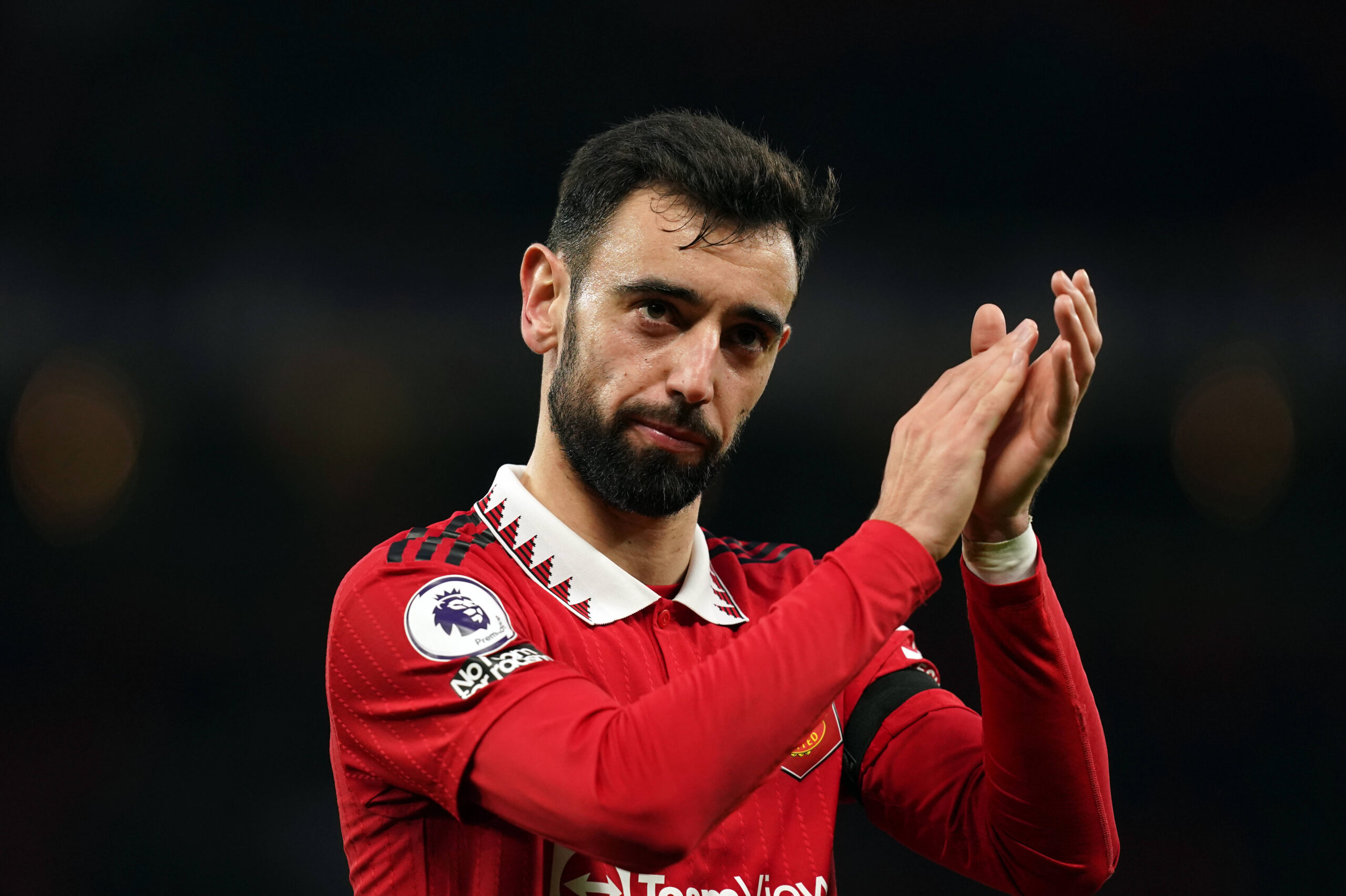
Bruno Fernandes has been at Manchester United for just over three years, recently making his 150th competitive appearance for the club against Leicester City.
Bruno Fernandes was brilliant once again on Sunday afternoon against Leicester City, assisting Marcus Rashford’s first goal of the game and Jadon Sancho’s brilliant finish for Manchester United‘s third.
Fernandes, since his time at the club, has broken some pretty hefty records, most notably the record Frank Lampard held for most goals scored by a midfielder during a single season, scoring 28 goals in a single campaign across the 2020/21 season – his first full season at United.
When Fernandes signed for Man United at the end of the 2020 January transfer window, his impact was truly one of a kind. He scored 12 goals and created a further eight assists across 23 appearances in the second half of that season, hauling United from a poor position to finish third in the Premier League.
Read More: Erik ten Hag keeps Roy Keane promise ahead of Carabao Cup final
That was coupled with the remarkable aforementioned 2021/22 season, where he scored 28 goals and assisted 17 across 58 appearances, with United finishing second in the league behind Manchester City that campaign.
That season and a half was proof that Manchester United relied on Bruno Fernandes’ goals more than anything else. This point was then further proved by the 2021/22 season, where once Fernandes’ performances and outputs dwindled, so did United’s results and league position.
Now, Fernandes’ 2021/22 season statistics are still very respectable – he scored 10 goals and assisted 14, which would be seen as a very good season for most midfielders; but when this is compared to his previous two seasons, it’s a less impressive showing.
That season, United finished 6th in the league on just 58 points, crashing out of the Champions League in the round of 16, as well as in the earlier rounds of the FA Cup.
It was a season where so often results were determined by the performances and outputs of Cristiano Ronaldo, with many speculating that Fernandes’ poor displays were as a result of the ball being forced towards the striker. There is certainly merit to this argument, considering that an uptake in Fernandes’ form has coincided with the termination of Ronaldo’s contract.
Under Erik ten Hag’s guise, Bruno Fernandes has been fantastic – this is a view held by many United fans, and Ten Hag himself has heaped praise on the Portuguese playmaker himself.
“For me, today Bruno Fernandes was brilliant. Best player on the pitch,” Ten Hag said on Fernandes’ recent display against Leicester City.
He has also praised Fernandes’ ability as a captain and a leader, telling reporters: “First as captain, he’s an example on the pitch with the energy he puts in, and for our tactical approach in both the transition moments. Bruno is so important for this team. He’s a great example for everyone in the squad.”
This season, statistically, Fernandes has scored seven goals and provided 10 assists in 36 appearances, which as mentioned above, are not as ‘impressive’ as seasons prior. Last season, this could have spelt disaster at the club; but in contrast to before, Fernandes is probably having his best overall season as a player within the squad.
This can only mean one thing: Manchester United no longer need to rely on Bruno Fernandes’ output in order to clamber themselves to Champions League places.
Bruno Fernandes’ evolution in this United squad has gone from him being the main focal point at the club to being probably the most significant leader in the squad, with it being Fernandes who has taken the reigns of captaincy as Harry Maguire has been dropped to the bench for the majority of this season.
This also signals an evolution at Manchester United, lending to the prospect that the side are now a fully functioning team, rather than a collective of individuals who happen to be wearing the same coloured shirt passing to Fernandes and hoping he saves the day – it felt like that for a long time.
A huge chunk of credit has to go to Ten Hag with respect to this. Erik ten Hag has, in the last seven months, spread out a significant portion of the burden that hung on Fernandes’ shoulders within the rest of the squad.
Read More: Former midfielder names Marcus Rashford as the best player in the Premier League
Marcus Rashford’s form means Fernandes does not need to score every game. The signing of Christian Eriksen and rejuvenation of Jadon Sancho means less emphasis needs to be placed on Fernandes’ creative output. The signing of Casemiro means Fernandes does not need to expel as much energy running in midfield.
Even in defence, the signing of Lisandro Martinez and consistency found in Raphael Varane adds extra leadership qualities spread across the field right from the very front to the very back. Wout Weghorst’s signing has meant there is an extra man up front to press the oppositions back line – something Fernandes had to do often in previous seasons (and was often criticised for it, too).
This is not to say that United don’t rely on Fernandes any less than before, it’s just that that reliance has changed. It has shift from tangible and external results such as goals and assists to more intangible qualities such as leadership, motivational and presence-related qualities. His role as de facto club captain arguably means the club are now more reliant on him than ever before, but just in a different light.
This allows the team to feel more comfortable and confident, allows Fernandes more freedom to play his best football, and means that, as a club, United are more, well, united.
Fernandes has become more than just a talisman for the team, he is a representative of everything the club stands for – and the squad are better off for it.